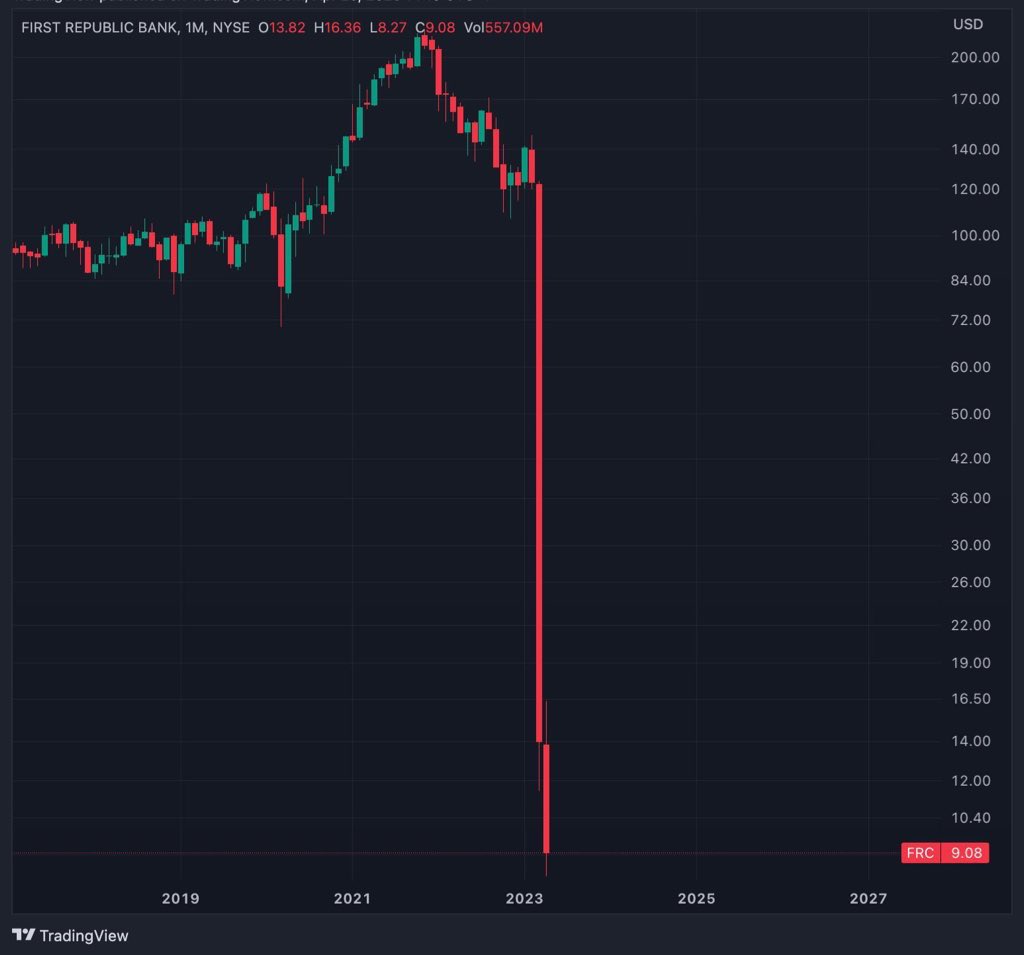U.S. News
This Bank Is Collapsing

First Republic Bank, a regional bank based in San Francisco, is facing financial troubles that have put the institution’s fate in the hands of the US government and its competitors. Here are the key points to keep in mind:
- First Republic Bank has been experiencing significant stock drops, which have led to regulators waiting to step in and to see if other banks can help avoid a complete collapse.
- The bank has already received $30 billion in deposits from other banks, but those banks are hesitant to get more involved to prevent locking in losses. Executives at the large banks have expressed hope that waiting for a solution will lead to getting at least some of the deposits back.
- First Republic Bank has been impacted by its portfolio of loans with low interest rates, particularly its large portfolio of jumbo mortgages to wealthy clients. These loans have lost value due to Federal Reserve hikes, which have led to depositors pulling their money out.
- The collapse of Silicon Valley Bank in March raised concerns about the stability of regional lenders, leaving First Republic paying more for funding than it earns on many of its assets. Analysts predict at least a year of losses for the bank.
- The bank has emphasized that it remains fully operational and has enough cash to serve its clients. However, the bank is exploring strategic options as its situation continues to worsen.
First Republic Bank is a private American bank and wealth management company that provides personal banking, business banking, and private wealth management services. The bank was founded in 1985 and is headquartered in San Francisco, California. First Republic Bank operates in metropolitan areas including San Francisco, Los Angeles, San Diego, Portland, Boston, Palm Beach, Greenwich, and New York City.
First Republic Bank’s future is currently uncertain as the US government and other banks’ top competitors continue to hold back to avoid incurring substantial losses. The regulators have been reluctant to intervene, hoping that the banks that recently deposited $30 billion into the bank could resolve its troubles. The stock price of the bank has significantly dropped, losing 49% on Tuesday and 30% on Wednesday. The Federal Deposit Insurance Corp. has been contemplating the possibility of lowering its private assessment of the bank, which would limit its access to two Federal Reserve lending facilities.
Meanwhile, executives of several large banks are hesitant to get more involved in a way that could potentially lock in losses. Some believe that waiting could be better than intervening, potentially throwing good money after bad. However, regulators worry about who could be the next bank after First Republic to face challenges.
First Republic Bank’s problems stem from its extensive loans at low interest rates, including a significant portfolio of jumbo mortgages for wealthy clients, which lost value as the Federal Reserve hiked rates. This led to some depositors withdrawing their funds, leaving First Republic to pay more for funding than it earns on many of its assets. As such, the bank is expected to face losses for at least a year.
Despite the uncertainty, the bank remains fully operational, and executives emphasized in an earnings report that the firm has sufficient access to cash to serve clients. However, the bank is looking for strategic options. The regulators have urged industry leaders to find a private solution to shore up First Republic’s balance sheet, cautioning banks to be prepared for any potential eventuality.
source: yahooFinance

Wyatt Earp
May 2, 2023 at 7:14 pm
A planning out by the Biden administration and Democrat with the RINO in the republican party! They hope more bank collapse so other bank like JPMORGAN CHSSE bank can take over! Since Chase Bank is more liberal control bank. And most politicians bank at JPMORGAN Chase bank.